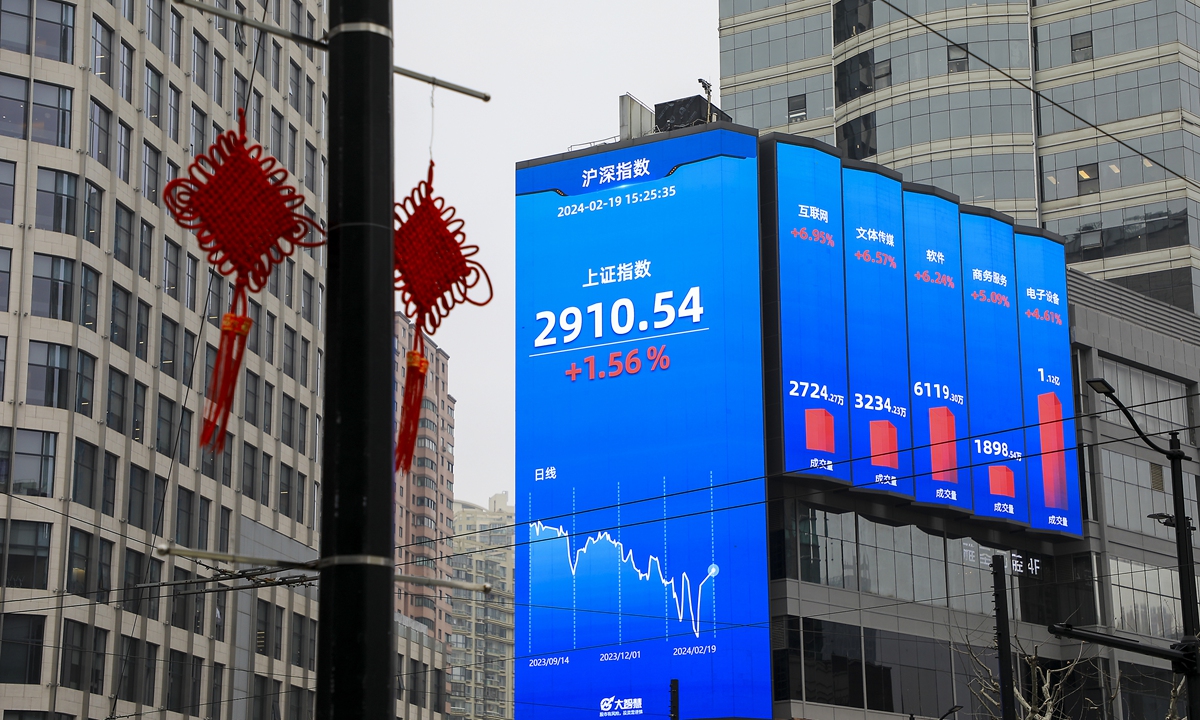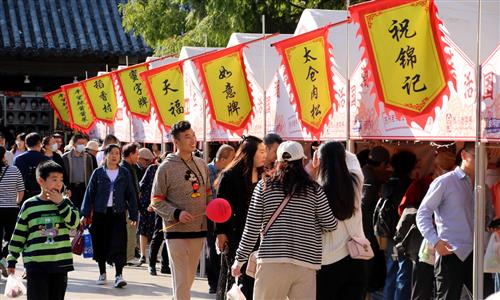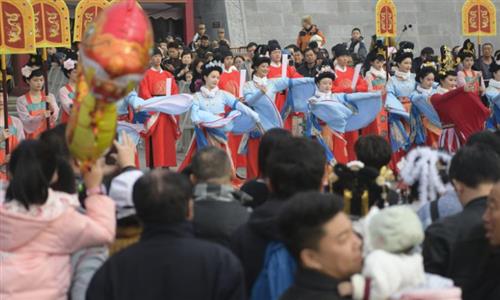Bullish start for China A-share market in Year of Dragon
Holiday spending boom, policy dividend continue to fuel growth

An outdoor billboard in Shanghai shows Shanghai Composite Index rebounding 1.56 percent to 2910.54 points on February 19, 2024. Photo: VCG.
With the country's economy on course to continuously recover thanks to the vitality of the consumption market and effective policy support, Chinese analysts and foreign institutions remain bullish on China's stock market as well as its economic growth in 2024, noting that the world's second largest economy will navigate stably to realize high-quality economic development and demonstrate its value in the global financial system.
Rally with upbeat data
China's stock market stretched its gains on Monday, with the Shanghai Composite Index seeing a 1.56 percent increase, regaining the benchmark level of 2,900 points. The Shenzhen Component Index rose by 0.93 percent, and the ChiNext Index, tracking China's Nasdaq-style board of growth enterprises, surged 1.13 percent.
Over 4,200 individual stocks saw a higher opening, and 270 stocks rose to their daily limit. Trading at Shanghai and Shenzhen stock markets reached 957.2 billion yuan ($132.9 billion). AI concept stocks rallied on Monday trading, with Sora concept shares leading the rise. Arithmetic and education shares also gained, while coal, oil and concept stocks continued to be strong.
China's top securities regulator on Sunday and Monday held symposiums to solicit public opinion on strengthening supervision and promoting high-quality development of the capital market, as well as risk prevention and mitigation.
Symposium participants advocate the industry watchdog systemically step up market oversight as the healthy development of the stock market is closely tethered to many investors' "pocketbooks."
The A-share Chinese stock market realized a three-day gain on February 8, wrapping up trading in the Year of the Rabbit. Over 1,000 stocks rose to their daily limit of 10 percent or more.
"The post-holiday stock market witnessed a good start and a continuation of a pre-holiday upward trend, which released a positive signal indicating that confidence in the Chinese stock market is gradually returning through a flurry of policy support," Yang Delong, chief economist at Shenzhen-based First Seafront Fund Management Co, told the Global Times on Monday.
In the volatile stock market, Exchange-Traded Funds (ETF) have become one of the important channels for large amounts of funds to enter the market. Since the beginning of this year, in just over one month, over 320 billion yuan of funds have entered the market with the help of equity ETFs, and institutional investors such as Central Huijin Investment have also made intensive efforts, media outlet stcn.com reported on Monday.
"It is a good sign for China that the stock market has ushered in a good start, which is a result of the pre-holiday release of various types of favorable policies. In addition, the better-than-expected performance of the consumption market during the Spring Festival holidays heralded the country's further economic recovery and restoration of investor confidence," Pan Helin, a professor at Zhejiang University's International Business School, told the Global Times on Monday.
During the eight-day Chinese Lunar New Year holidays, which ended on Saturday, 474 million domestic trips were made, up 34.3 percent year-on-year, and total domestic tourism spending jumped by 47.3 percent year-on-year to about 632.69 billion yuan ($87.95 billion), according to data released by the Ministry of Culture and Tourism (MCT) on Sunday.
Significantly, the number of trips made during the holidays represented a 19 percent rise from the same period in 2019 before the pandemic, and total spending increased by 7.7 percent from that of the same period in 2019, the MCT data showed.
"China enjoys a large domestic market and a leading foreign trade scale, with strong technological innovation momentum and vast potential of consumption and investment. China's stock market has a good foundation to further improve the system and enhance value-shaping power," Dong Shaopeng, a senior research fellow at the Chongyang Institute for Financial Studies at the Renmin University of China, told the Global Times on Monday.
Yang expects the market in the Year of the Dragon to embrace better investment opportunities, as economic recovery will be further strengthened, with an array of policies including the gradual relaxation of real estate policies, an increase in government investment and reform of the capital market.
Bright economic outlook
As the bustling holiday spending helps brighten the outlook for China's economic recovery in 2024 and beyond, Chinese experts and foreign institutions believe that the strong performance of the stock market is just a start for the country's robust economic growth this year.
China's GDP growth is expected to reach 4.9 percent in 2024, and we expect consumption and investment to be the main contributors to economic growth this year, Zhu Haibin, Chief China Economist and Head of Greater China Economic Research of J.P. Morgan, said in a recent report.
Zhu noted that consumption is expected to grow by 6 percent for the year, and income growth is expected to be the main driver of consumption, while the household savings rate is expected to fall further to pre-pandemic levels, which will contribute one percentage point to real consumption growth.
"Overall, we believe China's economy will continue to gain momentum in 2024, driven by a combination of consumer confidence, consumption activity, investment growth and supportive initiatives," said Lai Yizhe, Head of China Equity Research of J.P. Morgan.
As one of the fresh examples of foreign institutions entering China's financial market to seize opportunities, China's securities regulator recently sent feedback to Citi regarding its application to establish a wholly foreign-owned securities unit in China.
Pan said that with the US Federal Reserve's interest rate shift, foreign capital is expected to re-inflow to enrich the domestic investment and consumption liquidity, pushing up asset prices.
"I expect China's GDP to maintain a growth rate of 5 percent to 6 percent this year, highlighted by the expansion of domestic demand, especially the stabilization of the property market under the force of many policies," Pan noted.
In order to further spur economic growth, Chinese officials have convened meetings since the first working day after the holidays, with the focus on issues such as boosting market confidence and improving efficiency.
On Sunday, Chinese Premier Li Qiang presided over the third plenary meeting of the State Council, where he called on all departments to quickly enter the work mode after the holidays, earnestly and effectively deal with various work, and strive to promote high-quality development to achieve new results, in line with the plan outlined by the Central Economic Work Conference.
Specifically, Li urged to focus on solving practical problems of concern to the public and enterprises, do more work that are conducive to boosting confidence and expectations, maintain policy consistency and stability, and take pragmatic actions to boost confidence.
The National Financial Regulatory Administration held a meeting on Monday, noting that it will actively roll out policy measures conducive to boosting confidence and expectations. The administration also vows to guard the bottom line against systemic financial risks and crack down on illegal financial activities.
The State-owned Assets Supervision and Administration Commission of the State Council said during a conference on Sunday that centrally administrated enterprises should play a stronger role in technological innovation and security support. The commission will further optimize the layout and structural adjustment of state-owned capital, solidly promote high-quality and stable growth, and make sustained efforts in boosting market confidence and leading the industry's development, so as to effectively serve as a stabilizer and ballast for the national economy.





